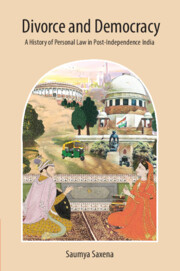Book contents
- Frontmatter
- Dedication
- Contents
- List of Figures
- Acknowledgements
- List of Abbreviations
- Introduction
- 1 Personal Law and the Making of Modern Religion, 1946–56
- 2 Committees, Codes, and Customs: Renegotiating Personal Law, 1957–69
- 3 Social Movements, National Emergency, and the Custody of the Constitution, 1967–79
- 4 Muslim Law, Hindu Nationalism, and Indian Secularisms, 1980–92
- 5 The Court in Context, 1992–2000s
- 6 From the Courtroom to the Courtyard: The Public Life of Personal Law, 2000–Present
- Conclusion
- Glossary
- Bibliography
- Index
4 - Muslim Law, Hindu Nationalism, and Indian Secularisms, 1980–92
Published online by Cambridge University Press: 20 May 2022
- Frontmatter
- Dedication
- Contents
- List of Figures
- Acknowledgements
- List of Abbreviations
- Introduction
- 1 Personal Law and the Making of Modern Religion, 1946–56
- 2 Committees, Codes, and Customs: Renegotiating Personal Law, 1957–69
- 3 Social Movements, National Emergency, and the Custody of the Constitution, 1967–79
- 4 Muslim Law, Hindu Nationalism, and Indian Secularisms, 1980–92
- 5 The Court in Context, 1992–2000s
- 6 From the Courtroom to the Courtyard: The Public Life of Personal Law, 2000–Present
- Conclusion
- Glossary
- Bibliography
- Index
Summary
I want to raise a question: Why do they talk of national integration through maintenance law? How is national integration directly concerned with maintenance to a divorcee, I want to ask.
—Saifuddin Soz, Lok Sabha Debates, 22 November 1985, col. 370The decade, it turns out, was dedicated to debating precisely this connection between divorce, nationalism, national integration, and democracy. The 1980s brought with it significant shifts in the nature of Indian politics. Colour televisions were making their way into India, and the license and regulation raj was gradually giving way to economic liberalization. With the introduction of the New Economic Policy aimed at opening up the markets in 1991 by the Narasimha Rao government, even the public–private divide within households underwent a substantial change. The liberalization of the economy entailed a problematic but definite feminization of labour. Further, the intensified struggle for limited resources produced anxiety and violence, some of which was absorbed by the rising Hindu nationalist movement by offering a common ethno-religious enemy in the Muslims. The idea of secularism became particularly potent with the consolidation of Sangh politics in the 1980s, which informs the broad context of the debates on personal law in the decade.
Formerly known as the Bharatiya Jana Sangh, which had had the support of the Hindu Mahasabha, the Vishwa Hindu Parishad, the Bajrang Dal, and the RSS cadres, the party was reorganized under the banner of the BJP in 1980 after a split from the Janata Party. The political party and the social movement collectively represented the Hindu nationalist front. Summoning the writings of V. D. Savakar and M. S. Golwalkar, who had been leading figures of the Hindu Mahasabha in the national movement in the mid-twentieth century, the Hindu nationalist movement in the 1980s invoked the shared heritage and history among Hindus for the ultimate end of establishing a Hindu rashtra (nation). One of the party's primary promises was the construction of a Ram Temple in the place of the sixteenth-century mosque, the Babri Masjid, which they claimed was built on the original site of the Ramajanmabhumi—the birthplace of the Hindu god Ram.
- Type
- Chapter
- Information
- Divorce and DemocracyA History of Personal Law in Post-Independence India, pp. 186 - 229Publisher: Cambridge University PressPrint publication year: 2022



